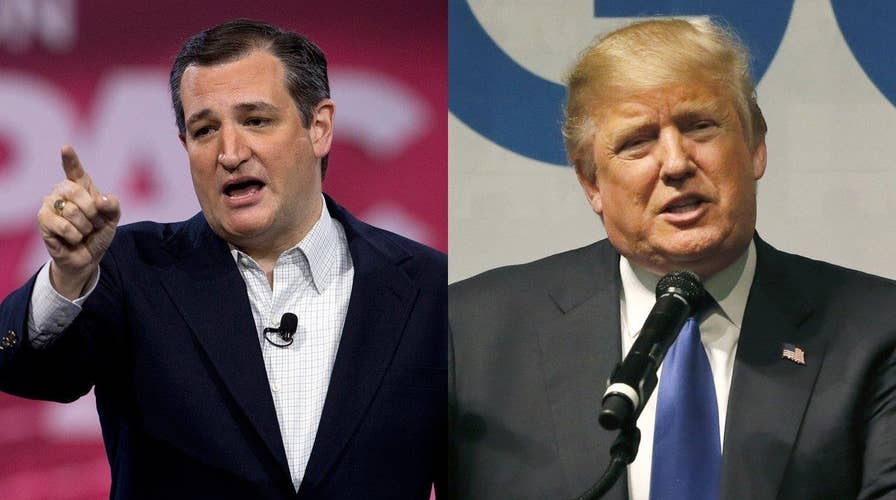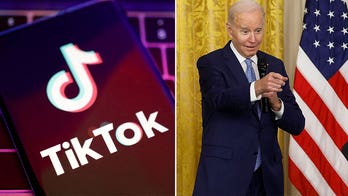Cruz, Trump in two-way race for GOP nomination?
Strategy Room: Douglas Smith and Adam Goodman discuss state of the GOP race
A pattern is starting to emerge that holds both promise and peril for Republican presidential front-runner Donald Trump:
Trump does better in “open” primary contests where members of either party can vote, while Texas Sen. Ted Cruz tends to do better in "closed" contests limited only to registered Republicans.
The pattern could lend credence to Cruz’s claim that he’s the “consistent conservative” in the race, and continue to pose challenges for Trump as more closed contests – including the critical Florida primary – loom on the election calendar.
But if Trump indeed is being boosted by crossover voters, it suggests he’s a stronger general election candidate than Democrats give him credit for.
“Trump’s got crossover appeal,” said Christopher C. Hull, former chief of staff for Cruz backer and Iowa Rep. Steve King.
To date, Trump has won a dozen contests, seven of which were open to voters regardless of party affiliation – and two of which have a hybrid system. He has won only three contests that were limited to registered Republicans – Nevada, Kentucky and Louisiana. (His victories in the latter two states were relatively tight.)
By contrast, five of Cruz’s six victories came in closed or semi-closed contests. The only exception was Texas, his home state.
Hull, president of the D.C.-based public affairs firm Issue Management Inc., who previously worked with an arm of a pro-Cruz super PAC, said this speaks to the kinds of voters each candidate appeals to. “Cruz’s supporters are conservatives, and Trump’s supporters are populists,” he said. “Some of [Trump’s supporters] are Reagan Democrats, some of them are Perot independents.”
But he said even though Cruz may be drawing in the grassroots conservatives, “It’s good to have crossover appeal.” He said Trump’s performance in the open primaries bodes well for his competitiveness in a general election.
Trump likes to boast he’s growing the party beyond its traditional base, bringing in Democrats and minorities and other groups who might not normally support a Republican candidate.
“Why can't the leaders of the Republican Party see that I am bringing in new voters by the millions-we are creating a larger, stronger party!” he tweeted after his Super Tuesday wins last week.
Still, Democrats – in public, anyway – doubt Trump, with his inflammatory rhetoric and controversial proposals, could truly build a big-tent campaign.
At Sunday’s Democratic debate, both Hillary Clinton and Bernie Sanders claimed they’d relish the opportunity to run against Trump in November, with Sanders even joking he’d give his “right arm.”
There may be another factor at play, though, in the contests thus far – and that is Cruz is performing better in the smaller, caucus states where organization matters most.
Republican strategist Adam Goodman, with The Victory Group, told FoxNews.com he thinks the results so far are a “reflection of organization.”
“Cruz is very well-organized. I think he came into this campaign with a strong investment in social media and on-the-ground troops, and I think that pays off especially in caucus states and smaller states,” he said. “Donald Trump maybe is a lot of things, in his campaign as well, but his campaign will not be written about in the record books as having the most organized effort in America.”
The upcoming primary calendar, though, doesn’t necessarily favor one type of contest over the other.
Two states are holding closed Republican contests on Tuesday, Hawaii and Idaho. But another two are holding open contests, Michigan and Mississippi. And while Florida’s primary on March 15 is closed, the contests in Ohio, Illinois and Missouri are open.
Meanwhile, the other two Republican candidates are fighting to notch their own wins wherever they can.
Marco Rubio, who has only won contests in Minnesota and Puerto Rico, is banking on a victory in his home state of Florida but has been trailing Trump in the polls there. John Kasich, the Ohio governor who mounted a very short-lived presidential campaign in the 2000 race and has yet to win a contest this cycle, is vowing to win in his home state as well.
Even as Trump and Cruz dominate the contests, it is unclear whether anyone could gain the necessary 1,237 delegates needed to clinch the nomination before the July convention. As of Monday, Trump has 384 delegates; Cruz has 300; Rubio has 151; and Kasich has 37.





